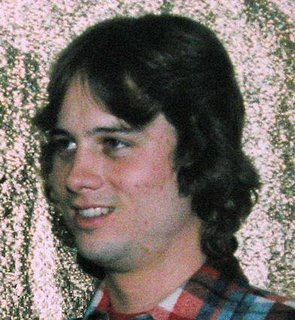And now, the REST of the story. There were other Whales.
On keyboards and flute, founding member John Steinberg was with the Whales for only a show or two. He was busy at college (not UA, but that OTHER school) and had to leave the Whales behind. Smart move. He went on to school somewhere in Iowa, got married, got a PhD, had kids, and got a real job designing satellites (You can take the boy out of the Rocket City, but...). He did come back and do a gig or two, it seems. Someone correct me if I'm wrong, but I think he was in a short-lived band around 1984 called Malcolm X. This group also included Kenny Crouch, Phil Proctor, Ant Sharpe, and Milburn Lominick. They did a few gigs around Huntsville and that was it.
Who remembers Orion? Anyone for Rage? What about TMAC? All of these featured guitarist/vocalist/frontman extraordinaire Terry McNeal (
www.terrymcneal.com). Terry's wife, Sheri, became a she-Whale for a weekend or two, as the band learned a few female-friendly tunes. Seems there was some Pat Benatar, Linda Ronstadt, Fleetwood Mac, etc. That was a weekend at Geno's Off the Square in downtown Huntsville, next to the long-since torched Lyric Theatre. Quite a few old structures around town fell to the flame back then. The girl-thing was fleeting (except in the case of Waddy G., of course). That was fun.
Now a fixture on the Huntsville music scene (if there really is such a thing), Antony Sharpe

joined the Whales at the ripe old age of seventeen. It was refreshing to hear someone sing Alice Cooper's "Eighteen" from the other side of the fence. Ant could play his booty off, and play it off he did. Still smoking with his band Toy Shop (
www.toy-shop.us). Check them out when you get a chance. Sharpe was in the Whales from 1983 to 1984. His musical abilities, added to those of bassist Crouch, gave the band a new vitality and helped forge a much more "real" rock & roll band sound. Ant recently celebrated his 75th birthday (still the youngest Whale), and he still plays and sings like he did way back during the Great Depression, when he performed at the White House for FDR. Unreal.

The year was 1983, or something like it. Out of the South came a howling wind, fierce enough to shatter the Spruce Goose. And they called it Opie. Sometimes known by his stage name, Mike Williamsom, Opie blew into town about the same time SRV hit the scene, and they both left their mark. Opie could play like nobody's business, and it was. He burned 'em down with an intensity that was hard to find in the Valley at that time. He filled in for the ailing Walter Berry at a gig or two, and went along for moral support at many more. Opie then found himself in The Loons with closet-rocker and Jewel Shop owner David Weinstein. Now THAT was a LOUD band. He later fronted The Pontiacs and set a new standard for blues-based rock guitar in the Tennessee Valley. After that came the self-deprecating Hugh Mungus Trio. Like so many lucky souls, he found a good woman, settled down, and put that rock & roll foolishness behind him. Oh, the humanity. Say it ain't so, Op, say it ain't so.
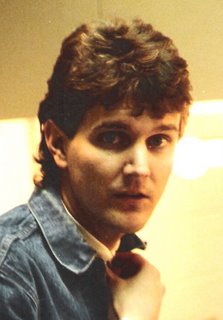
Filling Waddy's shoes is not an easy task. How is it done? Ask Keating Johns who stepped into the spotlight as a one-time Whale when he booked a gig for a band he didn't have (or the band fell apart after the gig was booked, or something). Keating called Proctor in the summer of 1984 (?) and offered him a gig at Birmingham Southern. His plan was to book the Whales, with Berry, and add himself on guitar and vocals. Good plan. Walter showed, played a set, and split, leaving the gig to the Whales with Keating as frontman. That association led to Johns calling Proctor the following year to fill in for his current lead guitarist on a club date in Tuscaloosa. The combination worked and with old friend Bart Mastin in on drums, the Power Mowers were off and running. But not for long. The name of the band was immediately changed to Instant Karma, a band that at various times included Johns, Proctor, Mastin, Greg Mullins, Ken Adams, and Greg Staggs. This band lasted from 1985 to 1988, making a name for itself throughout the Deep South. Let's see, 1985 plus 25 equals 2010...


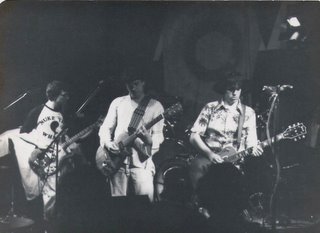
 Kaffeeklatsch, summer, 1981. Phil and John hard at work. Keyboardist John Steinberg is just out of sight to the left. Trophy is for dance contest winners/losers.
Kaffeeklatsch, summer, 1981. Phil and John hard at work. Keyboardist John Steinberg is just out of sight to the left. Trophy is for dance contest winners/losers. Very early gig with bassist Tommy Shepard. Tony Mason's place, October, 1981. Camelot Music employees seated down front. Note Walter's guitar a la Woody Guthrie. Sort of.
Very early gig with bassist Tommy Shepard. Tony Mason's place, October, 1981. Camelot Music employees seated down front. Note Walter's guitar a la Woody Guthrie. Sort of.

 Halloween at UAH, 1982 or '83. Tommy, Walter, John, Phil. Walter had started the evening in drag, performing "Sweet Transvestite." All good things must come to an end.
Halloween at UAH, 1982 or '83. Tommy, Walter, John, Phil. Walter had started the evening in drag, performing "Sweet Transvestite." All good things must come to an end.




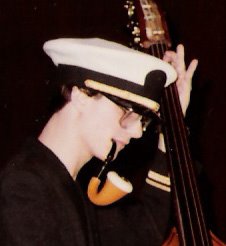 Bassists come and bassists go, and sometimes peter out, you know. But we'll be friends through thick or thin...Well, the original Whales bassist, by whose standard all others have been judged, was Philip Franklin. Nicknamed "Funky" for various reasons, Philip's first rock & roll band Zebedee, was formed in 1975. The lineup included fellow future Nuker Phil Proctor on guitar and future Whiz Kid Alan Jenkins on drums. That three-piece added a fourth member, Ed Miller, played a few YMCA dances, and then found itself without a bassist. Funky Philip had left the fold for more fertile musical territory with Robert Adamek and Thor. Well, jump ahead a few years and you have Philip and Phil rejoined in NTW, and the old magic was back (someone roll down the windows, please). Philip helped define the sound of the band with his bass as well as his voice. He catterwalled songs like "She's So Cold," "Surfin' USA," and the classic "Boogie 'Til You Puke." Philip also loaned the Whales his bitingly dry sense of humor, making those early road trips more fun than a vacation with Granny and the young 'uns.
Bassists come and bassists go, and sometimes peter out, you know. But we'll be friends through thick or thin...Well, the original Whales bassist, by whose standard all others have been judged, was Philip Franklin. Nicknamed "Funky" for various reasons, Philip's first rock & roll band Zebedee, was formed in 1975. The lineup included fellow future Nuker Phil Proctor on guitar and future Whiz Kid Alan Jenkins on drums. That three-piece added a fourth member, Ed Miller, played a few YMCA dances, and then found itself without a bassist. Funky Philip had left the fold for more fertile musical territory with Robert Adamek and Thor. Well, jump ahead a few years and you have Philip and Phil rejoined in NTW, and the old magic was back (someone roll down the windows, please). Philip helped define the sound of the band with his bass as well as his voice. He catterwalled songs like "She's So Cold," "Surfin' USA," and the classic "Boogie 'Til You Puke." Philip also loaned the Whales his bitingly dry sense of humor, making those early road trips more fun than a vacation with Granny and the young 'uns.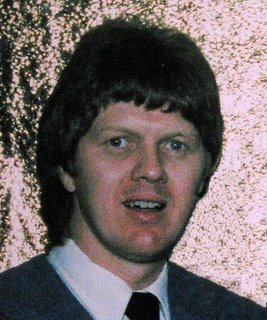
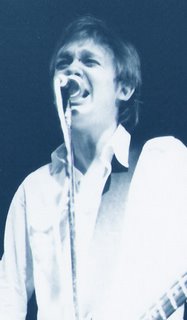
 Stroking his favorite guitars, his beloved Whales axes with names like Butchie Bob and Hazel, Berry intoned the intamacies of rock balladry like no one had since Harry McClintock back in the 1920s. When Casey Jones opened up the whistle on his 0-8-0, he was only a pale precursor to Waddy's mighty Blues Harps and Marine Bands. Trumpets of the gods. His prowess off the stage is also well-documented, but those court records are currently inaccessible.
Stroking his favorite guitars, his beloved Whales axes with names like Butchie Bob and Hazel, Berry intoned the intamacies of rock balladry like no one had since Harry McClintock back in the 1920s. When Casey Jones opened up the whistle on his 0-8-0, he was only a pale precursor to Waddy's mighty Blues Harps and Marine Bands. Trumpets of the gods. His prowess off the stage is also well-documented, but those court records are currently inaccessible. 
